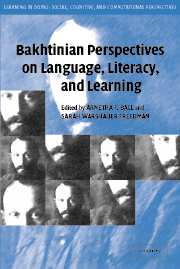Book contents
- Frontmatter
- Contents
- List of Contributors
- Acknowledgments
- PART I IDEOLOGIES IN DIALOGUE: THEORETICAL CONSIDERATIONS
- PART II VOICED, DOUBLE VOICED, AND MULTIVOICED DISCOURSES IN OUR SCHOOLS
- 5 Performance as the Foundation for a Secondary School Literacy Program: A Bakhtinian Perspective
- 6 Double Voiced Discourse: African American Vernacular English as Resource in Cultural Modeling Classrooms
- 7 Narratives of Rethinking: The Inner Dialogue of Classroom Discourse and Student Writing
- 8 Ever Newer Ways to Mean: Authoring Pedagogical Change in Secondary Subject-Area Classrooms
- Voices in Dialogue – Multivoiced Discourses in Ideological Becoming
- PART III HETEROGLOSSIA IN A CHANGING WORLD
- PART IV A CLOSING THOUGHT ON BAKHTINIAN PERSPECTIVES
- Author Index
- Subject Index
- Titles in the series
- References
8 - Ever Newer Ways to Mean: Authoring Pedagogical Change in Secondary Subject-Area Classrooms
Published online by Cambridge University Press: 24 May 2010
- Frontmatter
- Contents
- List of Contributors
- Acknowledgments
- PART I IDEOLOGIES IN DIALOGUE: THEORETICAL CONSIDERATIONS
- PART II VOICED, DOUBLE VOICED, AND MULTIVOICED DISCOURSES IN OUR SCHOOLS
- 5 Performance as the Foundation for a Secondary School Literacy Program: A Bakhtinian Perspective
- 6 Double Voiced Discourse: African American Vernacular English as Resource in Cultural Modeling Classrooms
- 7 Narratives of Rethinking: The Inner Dialogue of Classroom Discourse and Student Writing
- 8 Ever Newer Ways to Mean: Authoring Pedagogical Change in Secondary Subject-Area Classrooms
- Voices in Dialogue – Multivoiced Discourses in Ideological Becoming
- PART III HETEROGLOSSIA IN A CHANGING WORLD
- PART IV A CLOSING THOUGHT ON BAKHTINIAN PERSPECTIVES
- Author Index
- Subject Index
- Titles in the series
- References
Summary
The semantic structure of an internally persuasive discourse is not finite, it is open; in each of the new contexts that dialogize it, this discourse is able to reveal ever newer ways to mean.
—(Bakhtin, 1981, p. 346)The texts of educational research are replete with descriptions of teachers resistant to the pedagogical changes that others prescribe or mandate (Pajares, 1991; cf. Richardson, 1990). In the large body of research devoted to educational reform, teachers are often depicted – positioned – as unable, unwilling, unknowing, and/or unskilled. In this chapter, we aim to describe, instead, a professional learning environment in which teachers, who are seen as knowledgeable experts in their disciplines, are invited to engage in collaborative inquiry and to adaptively design classroom innovation. We describe the discourses that shape this learning environment and show how teachers, as a result of their collaborative experiences and exchanges, take up social and dialogical tools for imagining and authoring new pedagogical selves. We illustrate how, in the process, teachers begin to offer new possibilities for their diverse, urban students – themselves often positioned as unable, unwilling, unknowing, and/or unskilled – to enact new literate identities and practices in the classroom.
Bakhtin's key theoretical constructs of “dialogism” and “authoring” provide us with a theoretical framework for reflecting on the power and potential of inquiry-based professional development for teachers.
Information
- Type
- Chapter
- Information
- Bakhtinian Perspectives on Language, Literacy, and Learning , pp. 172 - 202Publisher: Cambridge University PressPrint publication year: 2004
References
Accessibility standard: Unknown
- 11
- Cited by
